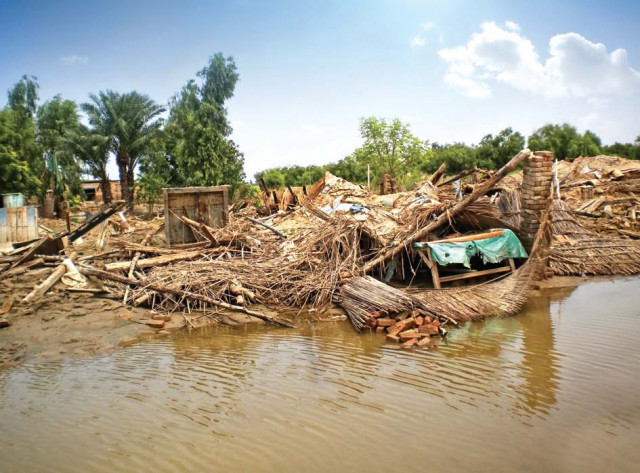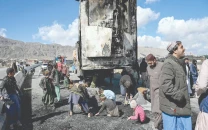Mehmood Kot, the shadow of a town
Most shops that have endured the flood water lie vacant and the few that have opened up have no customers.

Mehmood Kot, the shadow of a town
Most shops that have endured the flood water lie vacant and the few that have opened up have no customers to look forward to. “I opened my shop a few days back. The only customers I have had are outsiders who visit the area to see the impact of floods,” says 18-year-old Haider, who owns a general store on Mehmood Kot Road. His family has not yet returned from Multan. Haider and his younger brother, Zubair, stayed back like many male residents to look after the family’s belongings. “We are not expecting any customers. Most residents are yet to return. Those who stayed back have no means to buy anything,” he adds.
Though water has receded to the fields surrounding the town, it has left deep imprints that will stay for sometime. Among them are piles of folded prayer mats scattered on both sides of the Mehmood Kot Road for a good 100-metre stretch. It used to be Mehmood Kot’s most promising trade. With nearly 10 manufacturing facilities on both sides of the 20-to-25-foot wide road it catered to the needs of mosques in Muzaffargarh, Multan and adjoining areas.
“Very few will be of use now,” says an employee pointing towards a pile of folded mats in one such facility owned by Muhammad Iqbal. “We can only tell an exact figure after these mats are unfolded and dried in sunlight,” he says in response to a question about the extent of the loss, “Right now, all of them are a waste.”
Iqbal says that a 100-foot-long mat, made of a Kundar, a crop found in abundance in the area, was produced at a cost of Rs600. With around 400 mats bundled up in his godown, all soaked in flood water, he is eyeing a loss of Rs250,000 in Ramazan. “These were ready to be transported to the mosques. We will only get a comparable order next Ramazan now,” Iqbal says, adding that this month of fasting has been a ‘lost season’. He tells that most mosques order mats during Ramazan. “Every passing day is making us lose a part of our stock,” he adds. This is not the story of Muhammad Iqbal alone. Other mat manufacturing units have similar concerns. Some have started untying the mats by the roadside, hoping that part of their stock can be salvaged. Another worry is manufacturing machines. “They may need repairs before they could be functional again,” Iqbal tells.
Mehmood Kot, a town of around 30,000 workers had to face a double whammy. First a breach in the Lalpir Canal inundated the area. This was followed by flood torrents from River Chenab.
“The canal water was not very destructive. We had been aware of it in advance and guarded ourselves against it but the flood wave from River Chenab took us by surprise. It washed away most of the houses,” says 75-year-old Ghulam Qadir. Following the flood in Chenab, his 15 children and their families moved to the relief camps set up at the Muzaffargarh Road. Qadir and his wife stayed back. They have spent the past few days in a vacant shop. He pointed towards two partially demolished structures, still stranded in water, and said, “That was my house and the land behind was my field.”
Published in The Express Tribune, August 28th, 2010.



















COMMENTS
Comments are moderated and generally will be posted if they are on-topic and not abusive.
For more information, please see our Comments FAQ